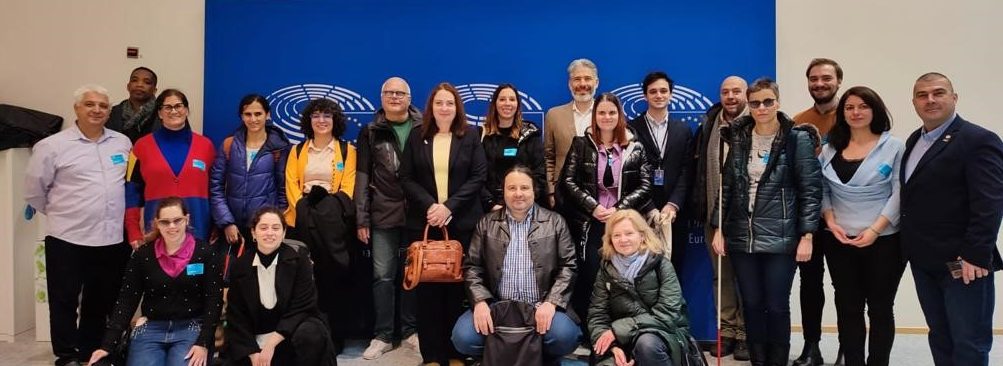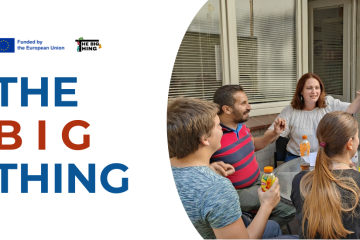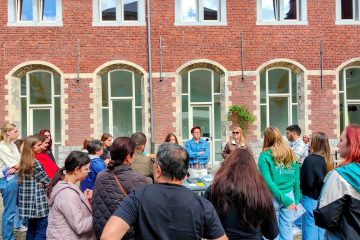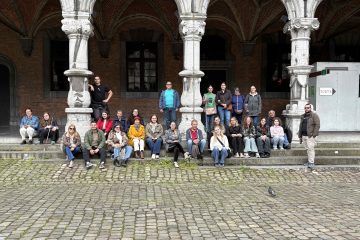
After two years of intense work with an enthusiastic community of young VIPs, educators and trainers, we can finally share complete access to all project results and methods.
These tools can be used by educational institutions and workplaces to employ and include young VIPs in the workforce on equal terms to their sighted counterparts.
During the final months of the project, the partnership carried out local and international events to disseminate and promote the complete and accessible versions of all the results of the VTJ2 project and its predecessor VIP TECH JOB. Partners will continue to network with relevant stakeholders to ensure the sustainability and use of all the project results.
A review of the project’s results
The VTJ2 project was developed as a response to the official statistics that show that the great majority of young and adult VIPs are left out of the employment sectors, despite their efforts, skills and competencies to find work as most employers are unaware of their abilities and knowledge acquired.
In addition to that, there is an expressed need for young VIPs to find actual and long-term employment, to co-create universally accessible workplaces and actively participate in society.
For this reason, the VTJ2 partnership built further on the results of the first VIP TECH JOB project by introducing a series of tools and resources that helped raise awareness by bringing together the voices, experiences and opinions of young VIPs.
Through tips and guidance for workplaces, it was possible to promote reasonable adjustments to support the participation of VI employees, while also providing them with extensive information on helpful legislation and state provisions.
The project results are now fully available and can be directly accessed via the project’s website: www.viptechjob.eu
Results in a nutshell:
● How-To platform: A series of mini-courses addressed to young VIPs and counsellors to provide them with useful information on addressing potential employers, preparing themselves for a job interview, learning their rights and responsibilities for new opportunities part of the VIP TECH JOB’s results
● Web App: An online web application addressed to job seekers and employers. It provides space for announcing open positions, facilitating research, interaction and accessible tools for job seekers to create their CVs and motivation letters. This tool keeps a record of interactions for future reference part of the VIP TECH JOB’s results
● Accessibility Toolbox: A complete educational curriculum, accompanied by practical guides addressed to trainers/educators, employers/recruiters and young VI job seekers. It aims to support the efficient use of the VIP TECH JOB/VTJ2 results, work on job-seeking practices, and familiarise with national and European legislations that facilitate access to employment. It is also useful to understand basic concepts and practices to make
workplaces – and not only – universally accessible and inclusive – part of the VTJ2’s results.
● Podcast: A series of episodes related to the preparation for job seeking and the job market. Through several interviews with VIPs, listeners can find out about their personal and professional experiences. Moreover, they discuss accessibility and technological development and voice their expectations, wants and wishes for the future – part of the VTJ2’s results
● Video Pack: A set of two distinct results: a practical guide (click here for the link) and a documentary (click here for the video). The practical guide aims to motivate young VIPs to make their own video presentations and feel more comfortable sharing their image as professionals.
On the other hand, the documentary aims to raise the voices of young VIPs. They share the importance of accessible spaces and practices, inclusion and their own opinions and experiences. In addition, young VIPs assess the VTJ2 project and its activities, by offering their insights for future and similar projects as part of VTJ2’s results.
The VTJ2 results are available in English, French, Spanish, Italian and Greek whereas the outputs of the previous project are also available in Romanian.
The WebApp is available in Polish too.
In addition to the multiplier event in Brussels, the Italian, Spanish and Greek organisations also organised local events:
The Italian partner organised its multiplier event on 23 February at AFORISMA’s premises in Pisa (Italy).
The event brought together various guests from local employment services, representatives of local political parties and the regional administration.
In addition, youth and disability organisations and individual participants enthusiastically joined the dissemination activity. During the presentation, AFORISMA showed a video collecting the experiences of the Italian participants of the training activity (LTTA) in Granada.
After the video, the organisers received positive feedback on the VTJ2 initiatives that enabled DV participants to travel and experience valuable training abroad. The audience as a whole was enthusiastic about the project’s activities and the results achieved over the lifetime of VTJ2.
At the end of the event, the audience expressed their willingness to suggest the results of the project to their colleagues and peers.
The Greek partner, DAFNI KEK, organised its multiplier event on 6 March in Thessaloniki, as it is the most accessible city in Greece and the majority of young DVs live and work there.
It boasts many inclusive educational initiatives, although access to employment and internships is still rare. The event took place at the School for the Blind, which is the regional department of the Centre for the Rehabilitation of the Blind. The outreach activity was joined by young blind and partially sighted people, educators from special education vocational schools and representatives of local, regional and national blind people’s associations.
The discussion that emerged from the presentation of the project and its results was very interesting and intense. It brought to the surface many relevant experiences from all participants and suggestions for future interventions.
The Spanish partner, DOCETE OMNES, organised its multiplier event on 13 March in Granada. In preparation for the event, two experts in the field of vocational integration and accessibility for people with vision impairments, Sandra Fernández and Antonio Tejada, were selected to talk about their experiences and share data and real cases in order to offer a broader perspective on the reality of people with disabilities.
The multiplier event was disseminated via a number of organisations and institutions linked to disability and inclusion, as well as recruitment companies. The target audience was made up of teachers and students in the technical training courses for higher technicians in socio-cultural activities and higher technicians in social integration.
The activity was a success because the team overcame the main challenge of involving and reaching the most relevant players for disseminating the project. Participants showed an interest in using the project’s tools in their daily or future work to become diversity ambassadors.
During the event, several topics related to the inclusion of DVs were discussed, which generated great interest among the participants, who expressed a positive opinion of the project tools.
“VIP-Tech-Job: Time 2 Act!” is a project developed within the framework of Key Action 2 of the Erasmus+ programme. The project is coordinated by VIEWS International (Belgium) and is based on the cooperation between AFORISMA (Italy), Docete Omnes (Spain) and DAFNI KEK (Greece). The project “VIP Tech Job: Time 2 Act!” targets visually impaired people (VIPs) and aims to promote their inclusion and integration through employment, while encouraging active citizenship and lifelong learning. It develops three distinct outcomes in the form of learning materials and interactive resources based on the results of the parent project “VIP Tech Job”, taking into consideration accessibility issues that directly involve VIPs through discussion groups, learning activities, mobilities and international events.
This project has been funded with support from the European Commission. This publication reflects the views only of the author, and the Commission cannot be held responsible for any use which may be made of the information contained therein.


